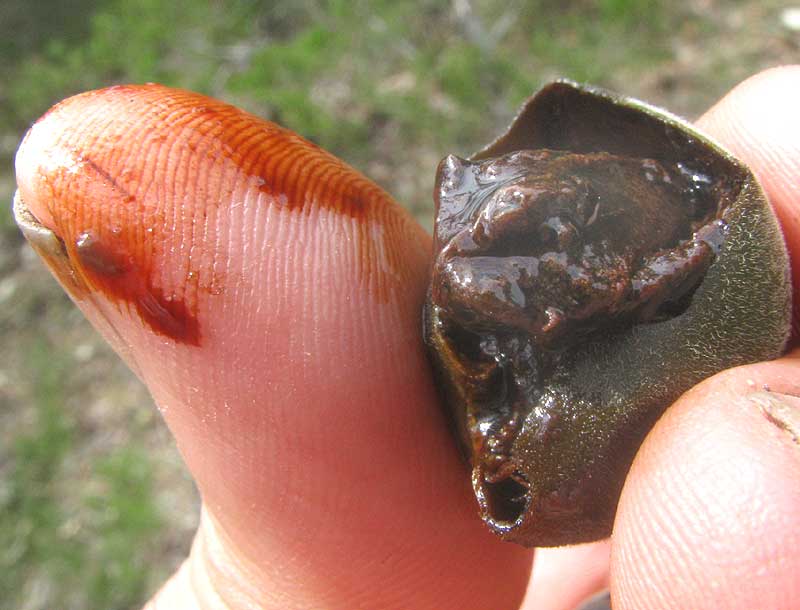
An Excerpt from Jim Conrad's
NATURALIST NEWSLETTER
of
September 22, 2013
Issued from the valley of the Dry Frio River in northern Uvalde County, southwestern Texas, on the southern border of the Edwards Plateau, USA

In southwestern Texas, in September, the abundant availability of
Texas Persimmons contributes to our "September Feeling"
On last week's anniversary of the 9-11 attack on the Twin Towers, like a lot of people I remembered where I was when it happened. I was hermiting in the woods in southwestern Mississippi. In my September 16, 2001 Newsletter I wrote, "... on the morning of September 11 with all the news crushing about me I went to the work table next to the upper garden and was greeted by several flats of freshly germinated lettuce. The flats had been sowed just three days earlier and now there was a tender yellow-green carpet in the flats' moist soil. It was a joy to see, a confirmation of things fresh and hopeful."
I remember those lettuce seedlings and the comfort they gave me on that sad day. Also I remember the September feeling all around me -- the first loosening-up of summer's overpowering heat and humidity, leaves here and there starting to turn colors -- a sort of sad, end-of-something kind of feeling, but also a sense of new beginnings. In September, songbirds grow quiet, for now they're molting, changing their beat-up and faded summer plumage for pristine new ones as winter approaches, and maybe a long migration south. For me, then, the September feeling is rooted in those experiences.
It's interesting that I can make up the term "September feeling" and you more or less understand what I mean, even though the term isn't in any dictionary, and your own September feeling certainly is different from mine. Using an invented name, my thought-associations and feelings, in a powerful and mysterious way, are transferred with certain changes to you. When you think about it, that's almost magical.
In fact, it's been shown in memory tests that people better remember a given color if their mother language includes a word for that color. That shows that names can help us see things. It's as Nietzsche said: Most people don't really see something unless it has a name. He wrote: "Wie die Menschen gewöhnlich sind, macht ihnen erst der Name ein Ding überhaupt sichtbar."
We don't need names for everything, though. In fact, maybe with fewer names we'd have to be more intuitive and empathetic with others in order to understand what's being said with a handful of named concepts. Some names even deaden us to reality. For instance, calling something "meat" instead of part of a cow's shoulder deflects feeling we might have about causing that cow to be killed so its shoulder can be eaten.
Well, the Middle Path is right: We need names for important things like trees, yo-yos and cornbread, but maybe it's a good idea to leave more nuanced and subtle entities nameless, so our minds can effervesce our own unique concepts as occasions arise. If the world of human thought is a garden, our unique conceptions are new species in that garden, adding to the garden's diversity, stability and beauty.
Whatever the case, long live the unnamed feeling of quiet birds with winter before them, and new feathers. Long live the nameless feeling of leaves drying and yellowing on gnarly-limbed trees. And long live this very moment, no matter when it occurs, in whatever month or place, this very moment with no name.